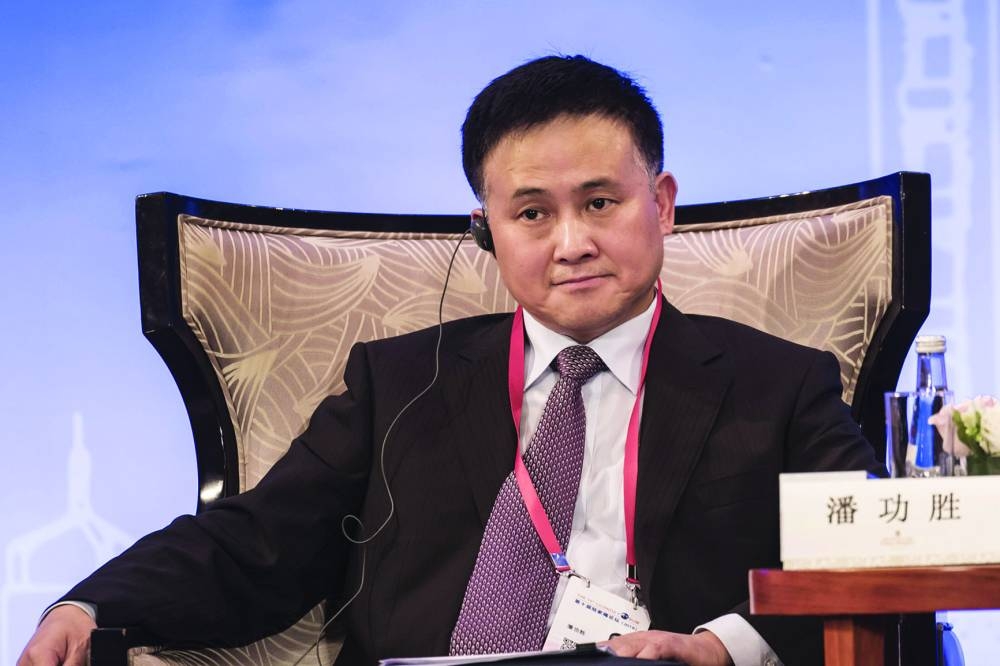China’s newly-appointed central bank Governor Pan Gongsheng comes with a strong record of tackling financial risks, showing he’s unafraid to sacrifice economic growth in order to achieve longer-term stability.
From managing the currency to cracking down on the property market, Pan will now have to draw on his decade of experience at the central bank to steer the economy through its current downturn. A key challenge will be balancing calls for more monetary stimulus against the risk of driving up debt in the economy.
A former deputy governor at the People’s Bank of China since 2012, Pan, 60, was promoted to the top post on Tuesday, taking over from Yi Gang, who retires. Pan was already appointed Communist Party secretary at the PBoC earlier in July — one of the two most-senior positions at the bank — and has been holding meetings with visiting officials like US Treasury Secretary Janet Yellen since then.
Pan has advocated for the cautious monetary policy of his former boss Yi, an approach that’s set the PBoC apart from central banks in the US and Europe in recent years. China provided only modest monetary stimulus during the pandemic, and has been cutting interest rates since last year while the other major economies have been hiking.
While Pan led market-oriented reforms in the banking sector and other areas, he’s also adopted tough regulatory steps intended to reduce financial risks identified by senior officials.
He is widely seen as having spearheaded the strict property measures imposed by regulators in 2020, which have resulted in a sharp contraction in the sector since then. Pan was also the public face for regulators’ probe into Ant Group Co and other Internet finance companies, and been outspoken on issues from cryptocurrencies to local government debt, taking a tough stance on safeguarding financial stability.
Even though Pan has a strong technocratic background with research stints overseas, “his appointment is not necessarily a sign that Beijing is returning to the growth-first and more market-oriented policies of previous decades,” said Neil Thomas, fellow for Chinese politics at the Asia Society Policy Institute’s Center for China Analysis.
His oversight of the property controls “shows he is comfortable with implementing growth-negative policies” to tackle structural problems, Thomas said.
Pan is probably best known for his role in managing the currency. As head of the foreign exchange regulator since 2016, Pan has overseen China’s $3tn in foreign reserves. During his tenure there, he tightened capital controls and defended the currency verbally at critical times.
The new governor doesn’t have any apparent connections to senior elites in the Communist Party, and he exited a top party body late last year, raising questions about his political influence and concerns about the PBoC’s sway in setting policy. To be sure, unlike other major central banks, the PBoC isn’t an independent institution, and reports to the State Council, China’s cabinet led by Premier Li Qiang. Ding Shuang, chief economist for Greater China and North Asia at Standard Chartered Plc, said Pan will probably be reliable in carrying out the policies of top leaders.
“Pan is an executor who can implement state policies in a smooth and low-risk way, which is also why the appointment is a comfort to markets because there won’t be much surprises,” said Ding. The new governor will face the challenge of mounting calls for monetary easing and a shrinking space for cutting interest rates, he said.
Born in the poor countryside of Anhui province in eastern China in 1963, Pan had a humble start to his career, studying and teaching economics at a junior college in the adjacent Zhejiang province. He eventually worked his way to the prestigious Renmin University in Beijing, where he earned a PhD degree in economics. During that time, he translated an American labour economics textbook into the Chinese language.
After graduating in 1993, he joined Industrial and Commercial Bank of China Ltd, where he rose through the ranks to eventually became a star executive playing a central role in restructuring and taking the state lender public in Hong Kong and Shanghai in 2006. His expertise was tapped again for the Agricultural Bank of China Ltd’s listing in 2010. The two were the world’s biggest initial public offerings when they went public.
Described by former associates as soft-spoken and scholarly, Pan has the technocratic approach of his predecessors at the central bank. He is known for taking a data and research-driven approach to problems and enjoys reading books about economics and finance in his free time.
Pan affirmed the PBoC’s restrained approach toward stimulus in recent years during his last public speech in June. Speaking at the Lujiazui Forum in Shanghai, Pan said China’s financial cycles have been significantly less volatile than in the US, measured by the swings of sovereign bond yields.
“The reason behind China’s relatively stable financial cycles is that China has stuck with a prudent monetary policy in the longer term,” he said. “China’s monetary policy is primarily based on domestic conditions ... it avoided following the Federal Reserve’s big tightening and loosening, and refrained from competitive zero interest rates or quantitative easing policies.”

Pan Gongsheng, China’s newly-appointed central bank governor.
